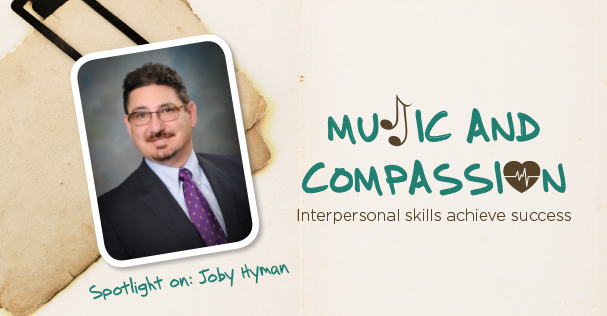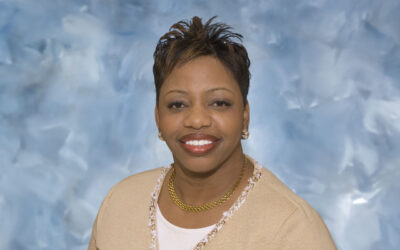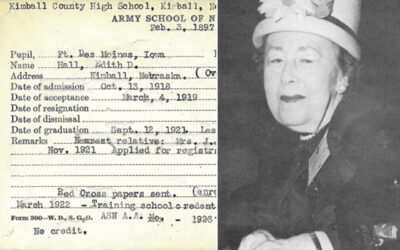Music and Compassion: Interpersonal skills achieve success
“What makes you a nurse is being able to talk to a patient, look at a patient, listen to a patient, and figure out what’s going on with that patient. There have been many times we have picked up on things that […] have helped that patient get better”
Born and raised in New Orleans, Louisiana, music was always an important part of Joby Hyman’s life. As his nursing career took him farther and farther from home, Hyman’s mother always encouraged him to continue singing. So when St. Luke’s Health System in Boise, Idaho, received its fourth designation as a magnet hospital and the keynote speaker was choral conductor and composer Eric Whitacre, the moment served as a reminder not only of how far he’d come professionally, but of the lasting presence of his family along the journey.
Whitacre’s Virtual Choir project, which involves linking up singers around the world through telepresence, is a unique one for musicians. Adding the challenge of digital latency to choral arrangements creates a wrinkle that more than complicates traditional performance. But in the effort, Whitacre and his singers made adjustments to create a performance that values expression and global engagement over technical perfection. The analogy was not lost on Hyman. Like music, nursing is a profession that requires compassion, and he believes that professional compassion is most accessible when people are free to be vulnerable.
“You have to be able to open yourself up and let other folks in on something that’s important to you.”
“You have to be able to open yourself up and let other folks in on something that’s important to you,” Hyman said. “If you get into nursing for the money or the pursuit of glory, you might as well not do it because you won’t be successful. You have to be a servant. You have to give of yourself.”
Hyman entered the medical field at a time when his education had reached a crossroads. His aunt, who was just beginning nursing school, told him, “This is right up your alley.” When he was accepted into a program, he imagined it would be a five-year commitment until he discovered the next opportunity. But after 21 years, Hyman’s nursing career has continued to evolve.
“With just a small amount of experience within the clinical realm, you can go into almost any area,” he said. “You can’t do engineering or architecture, [but] you can do legal, you can do sales; a plethora of things that folks who pigeonhole themselves into one area don’t have.”
On one travel nursing assignment, Hyman recalled hearing a coworker complain one day that “the folks in surgery didn’t get their 15-minute break and somebody had not brought their breakfast.” He thought to himself, “I’ve got to get admitted into that gig; in most units you’re lucky if you get lunch.” Hyman had worked in pre-op and recovery, but had never been in an operating room. He asked the OR manager for the opportunity to train.
“It was the challenge of the process; it wasn’t the challenge of the procedure,” Hyman said. “It hits home for me in these things. The surgery team has to work collaboratively. The folks who are scrubbed in, their assistants, the folks who provide anesthesia; we all have to work together as a team to make sure the patient has the best outcome.”
Hyman also enjoyed streamlining those processes to drive greater efficiencies in the surgical suite wherever possible. He strove to pare down the amount of time from the patient’s entry into the room to the start of the procedure. Anticipating surgeons’ needs, from instrumentation to planning to on-the-fly adjustments, were all areas in which Hyman saw opportunities to improve workflow in the suite, improve surgical outcomes, and limit the amount of time the patient is under anesthesia. He discovered that the best way to achieve those ends is by functioning as a key facilitator to the surgeons in his suite, who must process a staggering amount of information in real-time to perform their tasks.
“Surgeons are always concerned about what’s going on, what anesthesia is doing, the person that’s across from them assisting them, the person who’s across from them in the room, maybe asking for images to be put up on the monitors,” Hyman said. “My job is to go in there and for things to go as smoothly as possible, and for them to not remember a thing about it, especially me.”
“Any place I’ve gone to, I’ve always gotten the comment that I pay attention,” he said. “Being a nurse in the OR means being able to make decisions that help move things along.”
As conscientious as nurses must be in task management and in the execution of clinical techniques, however, nursing is more than changing dressings and fitting IVs, Hyman said. Without a strong secondary set of interpersonal skills, including the ability to assess patients and engage compassionately with their families, nurses aren’t as effective as they can be. Without those communication tools, they can even create a deficit at their position instead of becoming an asset to their patients’ wellness.
“What makes you a nurse is being able to talk to a patient, look at a patient, listen to a patient, and figure out what’s going on with that patient,” Hyman said. “There have been many, many times we have picked up on things that physicians don’t, that family members aren’t aware of, that have helped that patient get better.”
Those powers of observation also apply to helping nurses advance their careers. Today, Hyman has risen to become the Clinical Category Director of Supply Chain Management at St. Luke’s Health System in Boise, Idaho. He would not have attained the position without the ability to communicate the things he observed in practice to the leaders in his department. For nurses interested in similarly advancing their careers, Hyman advocates parlaying a strong bedside manner and clinical routine into process improvement.
“There have been times in my career where folks have not taken my enthusiasm positively,” Hyman said. “Decisions are made strategically from the C-suite and the E-suite, and those filter down. If nurses can have conversations with their directors or managers and say, ‘I hear the change, what can I do to help?’ you’re definitely recognized.”
“I’ve very rarely had a leader that I brought solutions to that fit within the framework of the culture of the organization and been told, ‘We don’t need your help,’ ” he said. “Everybody’s trying to go through these changes, and we all need help. The folks who do the front-line work have the best thought process in how we can accomplish things, and sometimes you have to reshape the thought process so that folks understand where we’re headed. When you’re able to do that … folks who really drive the organization [can] really build culture.”
Those “best thought processes” are similar to the skills Whitacre uses for his Virtual Choir project. It is no surprise that both men have achieved success.












